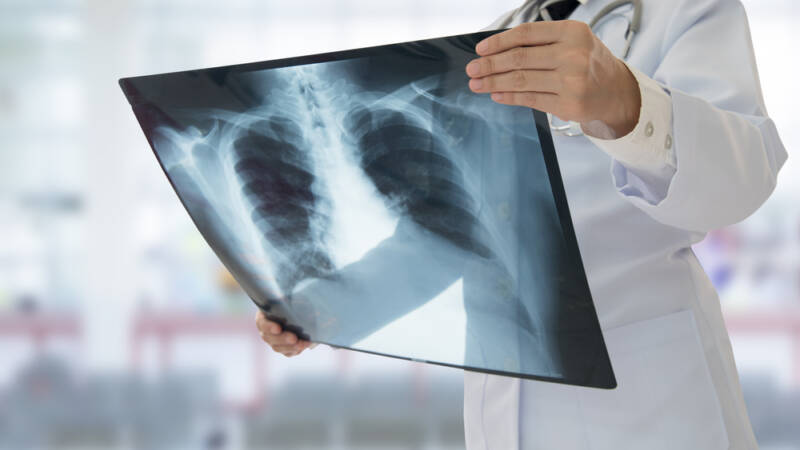Common Signs and Symptoms of Pneumonia

Pneumonia (pronounced new-mohn-ee-a) is an infection of one or both of the lungs caused by bacteria, viruses or fungi. Swelling (inflammation) occurs due to the infection causing the lungs to fill with mucus and other fluids, making it more difficult to breathe.
Anyone can get this infection. Newborns and infants often show little to no symptoms, while seniors or people with weakened immune systems often experience more severe symptoms. This infection causes approximately 150,000 hospitalizations in the United States every year.
Causes and Types of Pneumonia
Pneumonia is most often the result of a bacterial infection, though it can also be caused by a viral infection such as influenza, COVID-19, and respiratory syncytial virus (RSV). Pneumonia becomes contagious when disease-carrying organisms are breathed into the lungs. Pneumonia caused by fungi is not contagious as airborne spores are inhaled into the lungs from the environment.
Community-acquired pneumonia is the most common type and occurs outside of hospitals and other healthcare facilities.
Healthcare-acquired pneumonia is a bacterial type that occurs in people who live in long-term care facilities or who receive outpatient care in hospitals.
Hospital-acquired pneumonia develops when a patient is in the hospital for another illness. This type of pneumonia can be more serious, as antibiotics tend to be less effective. People on ventilators are at a higher risk of this type.
Aspiration pneumonia occurs when food, liquid, saliva or vomit go down the windpipe (trachea) into the lungs instead of going through the oesophagus to the stomach. If these particles are not coughed up and remain in the lung tissue, infections can develop that may lead to pneumonia.
Who’s At Risk?
People who have a higher risk of contracting pneumonia are:
- Children under the age of 2 and adults over the age of 65. Age is related to weakening of the immune system, making it more difficult for the elderly to fight illnesses. Similarly, babies’ immune systems are still developing, making them more susceptible to infection.
- People with weakened immune systems due to illness including those receiving chemotherapy, recipients of organ transplants, people who are HIV/AIDS positive, or who have an autoimmune disease (such rheumatoid arthritis, multiple sclerosis or lupus).
- People with health conditions that specifically affect the lungs and heart including asthma, cystic fibrosis, Chronic obstructive pulmonary disease, emphysema, bronchiectasis, pulmonary fibrosis, or uncontrolled diabetes.
- People who have neurological conditions that make it difficult to swallow like dementia, Parkinson’s disease, and stroke.
- People in hospital. The ICU is a risk factor, as patients spend long periods of time lying on their backs. This position makes it easy for fluids, mucus and germs to settle in the lungs.
- People who smoke and drink alcohol. Smoking damages the lung tissue and long-term alcohol consumption weakens the immune system.
- People exposed to toxic chemicals or fumes as these contaminants weaken lung functionality, making it easier to develop a lung infection.
- Pregnant women, since a woman’s immune system is not working at full strength while the body works to support the growth of the baby.
Signs and Symptoms
The signs and symptoms of pneumonia vary from mild to severe, depending on factors such as the type of germ causing the infection, the patient’s age and overall health, and other risk factors. They may include:
- Cough – may be dry, or produce thick yellow, green, brown or bloody mucus (phlegm)
- Difficulty breathing – may be shallow and rapid, and short of breath
- Palpitations
- Fever – high temperature, sweating or shivering.
- Feeling generally unwell
- Chest pain that gets worse when coughing or breathing
- Loss of appetite
- Fatigue
- Wheezing
- Coughing up blood
Complications of Pneumonia
Pneumonia complications are often preventable if the illness is treated promptly. If not, complications can become serious. Common complications include:
- Difficulty breathing can result in needing a ventilator while in the hospital to help your lungs heal.
- Fluid build-up in the lungs (pleural effusion or “water on the lungs”). The lining between the lungs and ribs becomes inflamed and if not drained, it can lead to respiratory failure.
- Lung abscess can form in the cavity of the lung
- Bacteria in the bloodstream, called bacteremia, can spread the infection to other organs.
Anyone can catch pneumonia and if not treated, it can lead to serious, even fatal, outcomes. Seek medical attention if you or someone you care for is experiencing these symptoms and practice prevention measures, such as vaccination, good hygiene, and immune system supporting actions like sleeping enough, exercising, and eating a healthy diet.